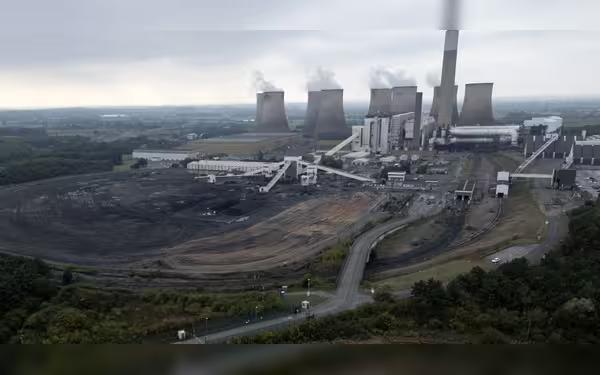Saturday, September 28, 2024 10:25 PM
UK Closes Last Coal-Fired Power Plant, Embraces Renewable Energy
- UK to close Ratcliffe-on-Soar coal plant by September 30th.
- Transition to hydrogen production aims for 500 megawatts capacity.
- UK leads G7 nations in phasing out coal power entirely.
 Image Credits: gnnhd
Image Credits: gnnhdThe UK closes its last coal-fired power plant, Ratcliffe-on-Soar, marking a significant shift towards renewable energy and hydrogen production.
The United Kingdom is on the brink of a significant milestone in its energy history. By the end of this month, the UK will close its last operating coal-fired power plant, the Ratcliffe-on-Soar power station located in Nottinghamshire. This closure, scheduled for September 30th, symbolizes the end of an era dominated by coal power, a source of energy that the UK once championed globally. As the world grapples with climate change, the UK is taking a bold step to leave behind this 'dirty energy' in pursuit of cleaner alternatives.
The Ratcliffe-on-Soar plant has been in operation since 1967 and has played a crucial role in supplying electricity to millions of homes. With a capacity of 2,000 megawatts, it has generated enough energy to brew over 21 trillion cups of tea throughout its lifetime, which is quite a staggering number! However, the time has come for the UK to transition to more sustainable energy sources.
Uniper, the energy company that owns the plant, has announced plans to repurpose the site for hydrogen production instead of coal power. Hydrogen fuel is a cleaner alternative, as it does not emit carbon dioxide when burned. However, it is important to note that most hydrogen is currently produced through a method that still results in greenhouse gas emissions. Uniper is exploring a cleaner method called electrolysis, which uses renewable energy to split water molecules and produce hydrogen. They aim to achieve a capacity of 500 megawatts by the end of the decade, which could potentially create up to 8,000 jobs in the area.
The history of coal in the UK is quite remarkable. The first coal-fired power station was built in London in 1882, and by 1900, coal was meeting over 95 percent of the UK's energy demand. However, as the world has changed, so too has the UK's energy landscape. Since 2012, coal's contribution to the UK's electricity mix has plummeted from nearly 40 percent to just 1 percent by 2023. This dramatic decline is a testament to the country's commitment to reducing greenhouse gas emissions, which have fallen by 74 percent in the power sector during the same period.
The UK has set ambitious climate goals, including a target of net-zero carbon dioxide emissions by 2050, as outlined in the Climate Change Act of 2008. With the closure of the Ratcliffe-on-Soar plant, the UK will become the first advanced economy and Group of 7 nation to phase out coal power entirely. This is a significant achievement and sets a precedent for other countries to follow.
As the UK turns the page on coal power, it is essential to reflect on the broader implications of this transition. The shift towards renewable energy sources not only addresses climate change but also opens up new opportunities for job creation and economic growth. While the journey may be challenging, the commitment to a cleaner, greener future is a step in the right direction for the planet and future generations.













